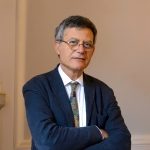He began his professional career as a reporter for Il Mattino di Napoli in 1978, following, in particular, the news of Naples.
In 1980 he moved to the Roman editorial office of Il Mattino. He covered some major news stories as a correspondent, such as the Bologna massacre, the Irpinia earthquake, and the Dozier kidnapping. In 1986 he joined the political editorial office of Il Messaggero in Rome.
In 1989 he became a political correspondent for Il Messaggero and in 1990 he became a commentator on domestic politics. In 1994 the director of Il Messaggero Giulio Anselmi chose him as the newspaper’s internal political commentator. In 1996 he became deputy director of Il Messaggero, voted by the assembly of editors with a very large majority. He was vice president of the Parliamentary Press Association from 1993 to 1996. In November 1996 he was appointed director of Giornale Radio Rai.
Since July 1999 he has also been director of Radio Uno, the music and news flow network entrusted to the editorial staff of GR.
Under his direction, successful programs were born such as Il baco del millennio, Baobab, Ho perso il trend, Con parole mie, Zona Cesarini, Music Club that combine high ratings with a constant search for quality. From April 2002 to November 2009 he was Director of Rai 3, where he increased the ratings often making it the third national network for daily share. Under his direction, numerous programs were born, including Ballarò with Giovanni Floris and Che tempo che fa with Fabio Fazio.
On 10 October 2011 he took up the role of director of LA7 and LA7d.
On April 28, 2014, he was appointed network director of TV2000 and Radio InBlu by Rete Blu S.p.A., the company that controls the broadcasters of the Italian Episcopal Conference. The position began on May 5 of the same year. On July 5, 2018, Pope Francis appointed him prefect of the Dicastery for Communication of the Holy See.

